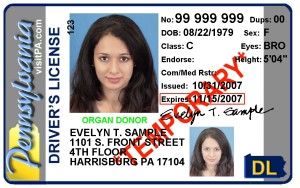State Rep. will get behind new effort to combat voter fraud, vetoed by Rendell in 2010

State Rep. Steve Barrar said he make another attempt in 2011 to gain passage of bill that would require voters to show photo ID, such as pictured above, when voting. A similar measure was vetoed by Gov. Ed Rendell.
By Mike McGann, Editor, UnionvilleTimes.com
Although the initial headlines may be only about finance and the budget gap, expect the state government to be busy in 2011, with a new governor, Tom Corbett, and a new GOP majority in the state legislature.
One local legislator, Steve Barrar (R-160), who represents Chadds Ford, Birmingham and Pocopson in the Unionville area, while acknowledging the ongoing fiscal crisis, notes that he has a fairly lengthy agenda heading into the new legislative session.
Barrar, who takes over as chair of the Veterans’ Affairs and Emergency Preparedness Committee, said this week he plans to be active on a number of fronts, but topping the list is a renewed effort for reform of voter rules and a new effort to require voters to show identification at the polls.
The eight-term state representative is pushing to revive elements of a bill passed by both houses of the legislature in 2010 but vetoed by outgoing Gov. Ed Rendell. The bill provided for free state IDs for those who could not afford the $10 fee and would have allowed any number of alternative ID forms, including a current PECO bill.
Pointedly, Barrar said he was pushing to eliminate voter fraud — an issue particularly in statewide elections as the remnants of old urban political machines have used “street money” to generate votes. While such activities might be connected to Philadelphia or Pittsburgh, they happen in Chester County as well — as countywide political campaigns in both parties have been pressed for thousands of dollars to “get the vote out” — political code words for buying votes in places such as Coatesville. He cited concerns about college students voting at home via absentee ballot and then voting where they go to school, as well as some illegal aliens casting votes.
Barrar says that requiring photo ID at the polls would virtually end these abuses.
Barrar said he allowed the bill to be a little softened last year, with the idea of getting bipartisan support. Don’t expect that in 2011, he said.
“I won’t allow it to be watered down,” he said, noting that he’d prefer require an actual photo ID, rather than accepting utility bills as the final version of last year’s bill would have allowed.
Aside from offering free IDs to those who cannot afford one, Barrar said that voters without ID will be allowed to cast provisional ballots — and if they’re able to prove their ID, their votes will be counted.
“I’m not out to disenfranchise anyone,” he said. “But there have been abuses of the system. There’s nothing more sacred than the integrity of the vote and we want to ensure that.”
Along the same vein, Barrar, a Navy veteran, said he is concerned about making sure votes from actively serving military are counted. He pointed to those serving on submarines — which often stay underwater for months at a time — and those serving in remote outposts in places such as Afghanistan that are having trouble getting ballots back in time to be counted.
While he doesn’t have a ready fix — beyond extended the period for accepting military absentee ballots by five days — he says he wants to sit down with military authorities and come up with a system that gives proper access to voting to these active duty military personnel — and said that some sort of secure computer system could be looked at.
Voting issues aren’t the only issue on Barrar’s agenda. He said that he’d like end teachers’ strikes — that teachers’ unions ability to force a 15-day strike gives them the upper hand in negotiations with school boards.
“I think it gives them an undue advantage,” he said.
Although some have mentioned binding arbitration as possible alternative, Barrar said he wouldn’t support that — as it has been used with various public employees in neighboring states — teachers, police officers and others, and has proved costly to municipalities and counties.






